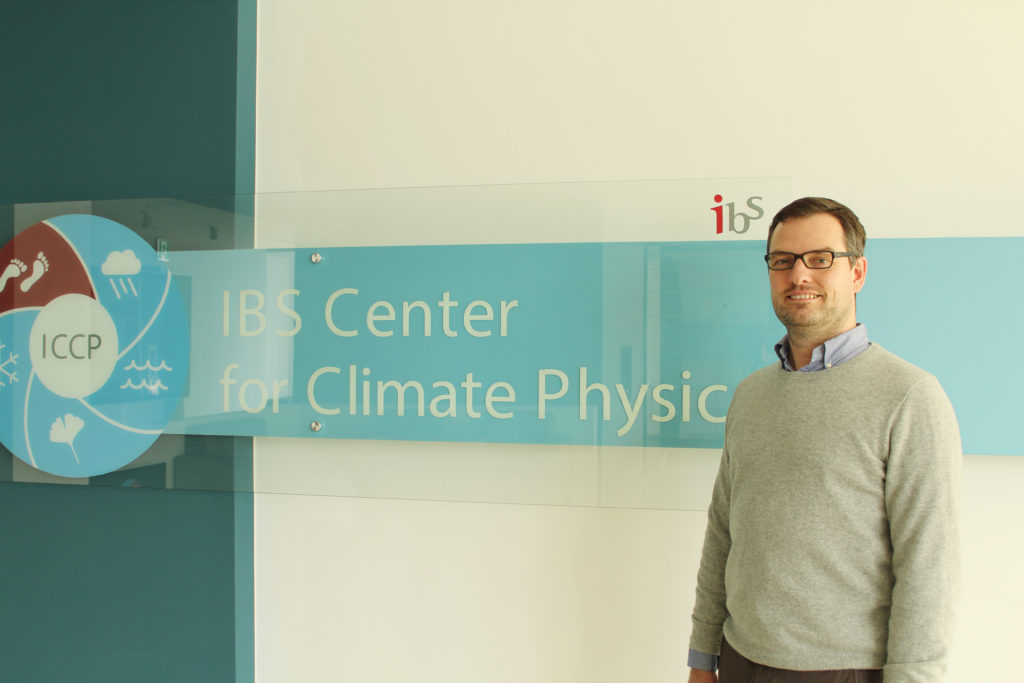
Malte F. Stuecker is an Assistant Project Leader at the IBS Center for Climate Physics (ICCP). Prior to joining ICCP in May 2018, he was
Q. What is your research project here at ICCP?
I am leading the group “Tropical climate dynamics: past, present, and future”. I am very interested in the physical processes that shape climate in the tropics, and how what is happening there affects the rest of the planet. For example, in a new paper, which has been just published in Nature Climate Change, I look at how different geographical regions including the deep tropics and mid-latitudes – affect climate change in the Arctic and Antarctic.
Q. Your paper on ‘Polar amplification dominated by local forcing and feedbacks’ has been published in Nature Climate Change in the end of last year. Could you briefly explain about your research?
When we look at the observations and also climate model simulations, we see that the polar regions warm much faster than the tropics, a phenomenon called Polar Amplification (PA). There are several hypotheses of why this is the case. For instance, some people have shown that temperature changes in the tropics determine how much heat from the tropics is transported into the polar regions. But in our study, we are able to demonstrate that the main reason why the poles warm more than the tropics in response to greenhouse gas emissions, is actually due to the feedback process in the polar region. Much of the extra heat that is transported from the tropics to the high latitudes in the atmosphere is compensated for by changes in the heat transport of the oceans. In fact, if the tropics are warmed by CO2, the whole planet more or less warms evenly everywhere. In contrast, a CO2 increase in the polar regions warms the planet unevenly, with more warming on the poles compared to the tropics.
Q. What has been your most important scientific finding?
A finding I am very excited about occurred during my Ph.D. research on how El Niño interacts with the annual cycle. This interaction creates a lot of previously unrecognized climate variability. Crucially, this El Niño-annual cycle interaction explains observed East Asian Monsoon variability, which affects some of the most population-rich areas of the world.
Q. Why is your research important? How can it be applied to real world?
We know that the most predictable climate signal in many regions of the world on timescales ranging from several months to years is the El Niño phenomenon in the tropical Pacific. Gaining a better understanding of the physical processes of El Niño is our best bet in improving seasonal rainfall and temperature prediction for many parts of the world.
Additionally to processes in the tropical Pacific, climate variability in the Indian Ocean also affects Monsoon variability. Recently, we developed a new model that takes account of our skill in predicting El Niño as well as of our understanding of how El Niño affects the Indian Ocean climate. We are able to demonstrate that our model significantly improves predictions of the climate in the Indian Ocean sector. This work is still under review but we are confident that our model can be soon used in operational forecasting.
Q. Why did you become a scientist?
When I was in high school, my favorite subjects were mathematics and philosophy, as they both encompass the beauties of logic and critical thinking. The first time I got inspired about research and a potential career in academia was when l was introduced to Earth Sciences. To this day I am driven by curiosity of how our Earth works, especially trying to understand the processes occurring in the vast oceans and the atmosphere above.
Q. What is the most difficult part of your research? And how do you deal with the difficulties?
Every project has different challenges. However these challenges are exactly what makes research exciting, being finally able to understand something that was previously unclear or unknown. Additional fulfillment comes from the fact that this improved understanding can then be used to benefit humans across the globe, for instance by the aforementioned examples of improved seasonal forecasts or improved projections of climate change in the polar regions.
Q. How’s your life in Busan, Korea?
Very good – I like Korean food and spending time in the ocean, for instance surfing at Songjeong beach. I particularly enjoy the nature surrounding Busan. Every place has a slightly different research culture and environment. The research environment here at ICCP is fantastic due to a very open discussion culture and the high number of great colleagues. Furthermore, I highly appreciate the excellent administrative support for our researchers, which allows me to focus efficiently on my science. Before coming to Korea, I took Korean language classes in Seattle for 5 months. However, my progress in learning the language has been a bit slow so far. Hopefully I will find more time to learn Korean soon.
Q. What is your future research plan?
I want to continue working on big, interesting, and challenging questions, not just only on small details. Especially working on problems that intersect various disciplines excites me, as I feel those are the areas where we can make the biggest progress. I enjoy working in international collaborative projects, sharing ideas, knowledge, and scientific tools with science friends across the globe.